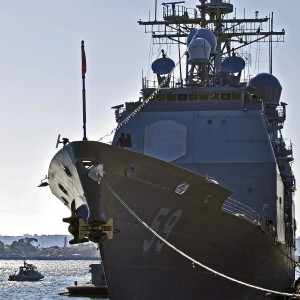On two of my three Navy deployments to the Persian Gulf, I stood watch on the bridge of USS Princeton. I was the Officer of the Deck (OOD), charged with maintaining the safety and navigation of the ship. Everyone on the bridge, from the lowliest seaman to the senior officers, was trained to be vigilant—and never more so than when we were operating off of Iranian waters.
It is exactly because of my experience on that ship that I support the Iran Deal.
It is no secret that the U.S. Navy maintains freedom of passage through the Strait of Hormuz, which is a mere 21 miles across at its narrowest point. Over a third of the oil transported by sea travels through the Strait, one of only a few global “choke points” in the trade of a critical commodity. One of the key reasons the U.S. Navy deploys there is to maintain freedom of passage against Iran, which has repeatedly threatened to close the Strait by any means possible, including the use of underwater mines.
Make no mistake, Iran is and was an adversary of the United States. The nuclear agreement does not change that—nor is it supposed to.
The goal of the deal is simply to deny Iran access to a nuclear bomb—the ultimate tool they could use to sow more chaos in the Strait of Hormuz and beyond. Unlike the phrase that I heard often in the military—“trust but verify”—this deal is based entirely on verification, not trust. Negotiators from the P5+1 countries have exercised tough, principled diplomacy to get this far, but they recognize that it will take rigorous inspections to ensure that Iran remains in compliance.
Many who oppose the deal seem to imply that negotiating with Iran—and granting them gradual sanctions relief in exchange for serious limits on their nuclear program—means that the United States somehow supports what Iran does or might plan to do in the Middle East. Nothing could be further from the truth. We know all too well that Iran harasses ships like mine in the Gulf and funds proxies that attack my fellow servicemen and women in Iraq. It is precisely because we oppose all of this harmful behavior that stopping Iran from acquiring a nuclear weapon is the top priority.
George Washington University Political Science Professor Marc Lynch called the Iran deal “the most significant American diplomatic achievement in the Middle East since the Camp David accords,” and I am inclined to agree. That historic 1978 agreement between Egypt and Israel relied on permanent observers on the border of those two countries, verifying compliance on both sides. Not everyone was happy with the final settlement—and it certainly didn’t prevent low-level conflict in the Middle East—but the relative peace was preferable to a war between two major nations.
If only the same were true of the Iran Deal. GOP Presidential candidate Scott Walker’s suggestion that he was likely to use air strikes against Iran is not the quick win that deal opponents would have you believe. Not only would such an attack likely result in further undergrounding of Iran’s existing attempts to develop a bomb, but it would also immediately change the operating environment of ships like mine currently in the Persian Gulf and threaten our allies who are within reach of Iran’s conventional and asymmetric forces.
Whether the deal is approved by Congress or not, the U.S. Navy will maintain freedom of passage through the Strait of Hormuz. My brothers and sisters in arms will always keep a heightened state of alert in that part of the world, and they will go to war when called. But thankfully, they’re not yet being asked to jump into yet another ill-conceived conflict. Instead, America is pursuing strong diplomacy that I, as a veteran, could not be more proud of. We can stay vigilant on patrol while practicing true diplomacy—indeed, we should aspire to nothing less.

